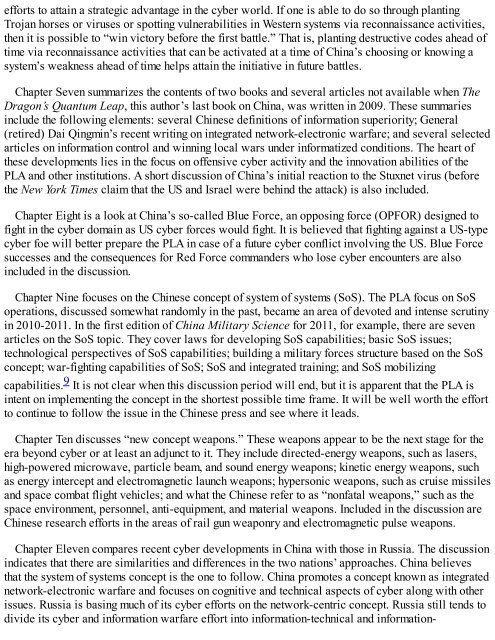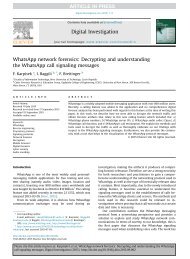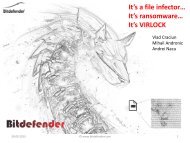3Faces%20of%20the%20Dragon
3Faces%20of%20the%20Dragon
3Faces%20of%20the%20Dragon
Create successful ePaper yourself
Turn your PDF publications into a flip-book with our unique Google optimized e-Paper software.
efforts to attain a strategic advantage in the cyber world. If one is able to do so through planting<br />
Trojan horses or viruses or spotting vulnerabilities in Western systems via reconnaissance activities,<br />
then it is possible to “win victory before the first battle.” That is, planting destructive codes ahead of<br />
time via reconnaissance activities that can be activated at a time of China’s choosing or knowing a<br />
system’s weakness ahead of time helps attain the initiative in future battles.<br />
Chapter Seven summarizes the contents of two books and several articles not available when The<br />
Dragon’s Quantum Leap, this author’s last book on China, was written in 2009. These summaries<br />
include the following elements: several Chinese definitions of information superiority; General<br />
(retired) Dai Qingmin’s recent writing on integrated network-electronic warfare; and several selected<br />
articles on information control and winning local wars under informatized conditions. The heart of<br />
these developments lies in the focus on offensive cyber activity and the innovation abilities of the<br />
PLA and other institutions. A short discussion of China’s initial reaction to the Stuxnet virus (before<br />
the New York Times claim that the US and Israel were behind the attack) is also included.<br />
Chapter Eight is a look at China’s so-called Blue Force, an opposing force (OPFOR) designed to<br />
fight in the cyber domain as US cyber forces would fight. It is believed that fighting against a US-type<br />
cyber foe will better prepare the PLA in case of a future cyber conflict involving the US. Blue Force<br />
successes and the consequences for Red Force commanders who lose cyber encounters are also<br />
included in the discussion.<br />
Chapter Nine focuses on the Chinese concept of system of systems (SoS). The PLA focus on SoS<br />
operations, discussed somewhat randomly in the past, became an area of devoted and intense scrutiny<br />
in 2010-2011. In the first edition of China Military Science for 2011, for example, there are seven<br />
articles on the SoS topic. They cover laws for developing SoS capabilities; basic SoS issues;<br />
technological perspectives of SoS capabilities; building a military forces structure based on the SoS<br />
concept; war-fighting capabilities of SoS; SoS and integrated training; and SoS mobilizing<br />
capabilities. 9 It is not clear when this discussion period will end, but it is apparent that the PLA is<br />
intent on implementing the concept in the shortest possible time frame. It will be well worth the effort<br />
to continue to follow the issue in the Chinese press and see where it leads.<br />
Chapter Ten discusses “new concept weapons.” These weapons appear to be the next stage for the<br />
era beyond cyber or at least an adjunct to it. They include directed-energy weapons, such as lasers,<br />
high-powered microwave, particle beam, and sound energy weapons; kinetic energy weapons, such<br />
as energy intercept and electromagnetic launch weapons; hypersonic weapons, such as cruise missiles<br />
and space combat flight vehicles; and what the Chinese refer to as “nonfatal weapons,” such as the<br />
space environment, personnel, anti-equipment, and material weapons. Included in the discussion are<br />
Chinese research efforts in the areas of rail gun weaponry and electromagnetic pulse weapons.<br />
Chapter Eleven compares recent cyber developments in China with those in Russia. The discussion<br />
indicates that there are similarities and differences in the two nations’ approaches. China believes<br />
that the system of systems concept is the one to follow. China promotes a concept known as integrated<br />
network-electronic warfare and focuses on cognitive and technical aspects of cyber along with other<br />
issues. Russia is basing much of its cyber efforts on the network-centric concept. Russia still tends to<br />
divide its cyber and information warfare effort into information-technical and information-










